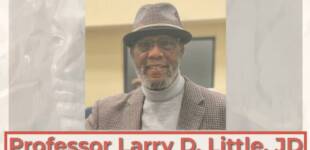Museum files complaint against Duke Energy
Swaine
BY CASH MICHAELS
FOR THE CHRONICLE
An attorney representing the International Civil Rights Museum (ICRM) in Greensboro has filed a complaint with the North Carolina Utilities Commission against Duke Energy, alleging that the public utility has threatened to shutoff electrical service to the facility at 134 South Elm Street “… unless it posts an $18,224.00 deposit, in addition to paying the regular electric bill.”
However, according to the complaint, filed Monday, the ICRM’s account with Duke Energy “… is now up-to-date and current …,” but that didn’t stop the utility from unexpectedly turning off the electricity for several hours without warning in February, a week after the museum paid its bill in full.
The complaint asks the N.C. Utility Commission “… that the service be ordered to remain on until the Commission can rule on this complaint in a final ruling and that no deposit be required until there are further orders of the Utility Commission.”
A top historic attraction in downtown Greensboro, the ICRM is housed in the former F.W. Woolworth Store that four N.C. A&T University students boldly ordered food at from the whites only counter on Feb. 1, 1960 this reigniting the Civil Rights Movement. The facility was reopened on the 50th anniversary of the sit-in as a civil rights museum in 2010, and opens ed its doors to school children, and visitors from around the world.
Addressed to the commission’s chief clerk, the letter from Greensboro attorney Douglas S. Harris is on behalf of Sit-in Movement Inc., a nonprofit corporation that runs the ICRM and owns the South Elm Street property.
Harris tells the commission, which regulates public utilities in North Carolina, that the museum was “…under some temporary financial pressure due to financial charges associated with the successful completion of….” two federal tax credit programs related to historic properties and “financially distressed areas.”
Duke Energy as “working with” the museum during this time, Attorney Harris continued, and was informed by the museum that “…all past due power bills [would be] caught up by the end of February and be completely current…(which was accomplished),” he added.
Duke Energy sent a written notice to the museum on Jan. 25, stating that if the bill was not caught up by February 16th, that power would be disconnected, the letter continued. So checks were sent to Duke “…the week previous to the due date which checks should have cleared and did clear…,” but on February 16 at 8 a.m. in the morning, power was cut off without any notice, written or otherwise to anyone at the museum.
A source confirms that the museum’s checks were at Duke, which ended up putting the power back on at 11:30 a.m. that same day.
“Our director, John Swaine, … contacted Duke Energy who confirmed that they did have the checks; two hours later, Duke Energy cut the power back on without a deposit or reconnection fees by reason that it was their error and not the museum’s,” Attorney Harris wrote.
But the power interruption did force the museum to refund $765 to a “…large group of eighty-one disadvantaged school children” who had bused in from Union County to take a tour. A corporate conference had to be moved across the street, forcing the ICRM to refund $800 for that.
And a group from Durham also had to have their tour cancelled and money refunded.
“All of this happened because Duke Energy varied from its usual routine … of informing Director Swaine that there was a problem,” Harris wrote in the complaint.
The ICRM attorney further charged that the museum was being treated differently from “other companies which used more power and had hundreds of thousands of dollars in electric bills overdue for months [and] did not have the power cut off and did not have to provide a deposit.”
Attorney Harris charges that the Duke Energy liaison to the museum did not inform Director Swaine of the cutoff in order to “… help those forces who wished to take over the Museum …,” and in the past has expressed “concerns” about the ICRM’s leadership and direction.
That Duke Energy liaison “…injected [himself] into the situation to help put financial pressure on the museum, embarrass the museum, and to hurt fundraising with the end result that the black-run Civil Rights Museum in Greensboro would collapse …,” Attorney Harris continued.
Paige Layne, a Duke Energy spokesperson, said, “Disconnecting a customer’s service is the very last step in our collections process and it’s an action we never want to take. We work closely with all customers who have difficulty paying their bills so service interruptions can be avoided, and we’ve worked with this customer for years. While it’s unfortunate that our efforts to assist the museum’s leaders with their delinquencies have resulted in a formal complaint to the N.C. Utilities Commission, we will cooperate fully within the process to ensure facts about the experience, including the basis for the deposit requirement, are presented.”










